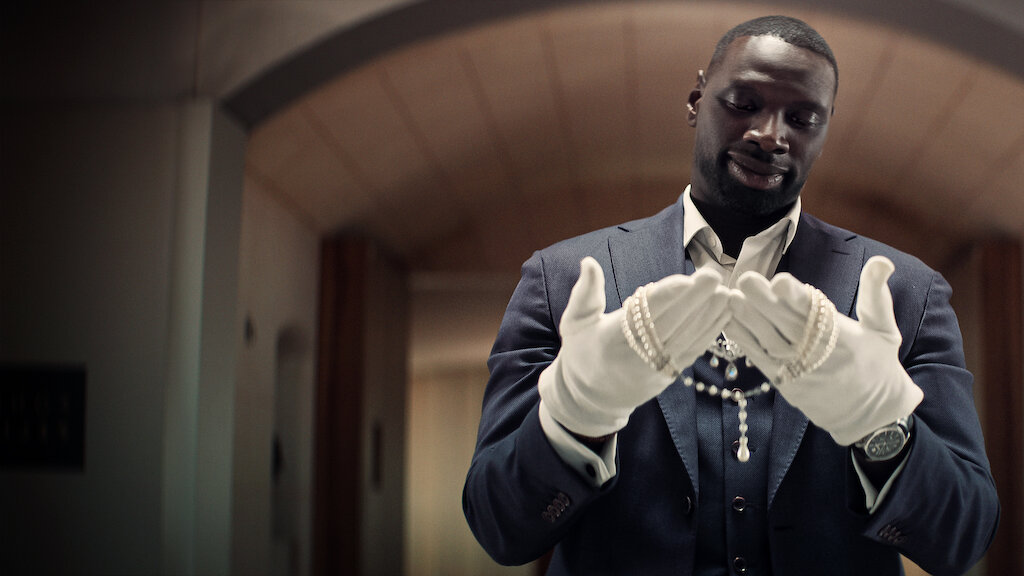If the Republicans are relegated to running on the President’s slogan, “Make America Great Again,” the Democrats’ implicit slogan is “Make America Europe.”
The Impotence of Modern France's Lupin
Audiences crave stories about racial harmony, which is why French comedian Omar Sy has become internationally famous. He made his name in The Intouchables (2011), the story of a poor, young, black man who nurses a rich, white paraplegic back to life. This friendship across racial and class lines made it the most popular French movie in this generation, in France and around the world, so much so that it was remade in Hollywood with Kevin Hart.
Such stories are so successful not only because they are reassuring about racial relations and therefore about our shared humanity, but because they ignore politics. The Intouchables’s story of a French aristocrat of ancient lineage befriending an immigrant from Senegal makes us ask, what’s France all about? It’s certainly not about De Gaulle, Pascal and Descartes, the film would suggest, or the great novelists, painters, scientists, and intellectuals. It’s paragliding and driving fast cars.
But this doing of daring deeds is itself ambiguous. Does the poor but virile black man intend to restore some manliness to the rich but crippled white man? Do they share in a proud rebellion against a cosmic injustice—man’s natural weakness, mortality, and the limits set to our will? Or is manliness really unimportant and instead humanity is somehow about finding joy together in life itself, free from society and its encumbrances?
Perhaps these questions are not on the minds of audiences. Viewers will draw their own questions and conclusions. Those who admire manliness can take this as a comic version of Invictus. Those who don’t can look to the egalitarian aspect. Those who want the old France revivified can enjoy that dream; but those who want to put an end to it and have a new France instead can also smile on this story.
Theft and Justice
Netflix attempts to answer these questions in its very successful action-packed new adaptation of the story of master thief Arsène Lupin, the splendid, daring gentleman-thief of the Belle Epoque. Arsène Lupin is now Assane Diop, played by Omar Sy, son of a Senegalese immigrant whose life is ruined by an evil, rich, white Frenchman. The hope of racial and class harmony is dashed at the beginning of the show, when the father is driven to jail and suicide by the wicked, ungrateful accusations of his employer. The only question is how radical the attack on the French regime will prove.
We start with an attack on aristocracy: Diop’s father, a perfect gentleman, was framed for the theft of a necklace by the wicked man he served loyally. He died in jail, never to see his son again—a rather Romantic story, recalling Hugo and Dumas. This is not merely about low-class immigrants facing injustice—it’s also a warning that loyalty and belief in high principles are deadly. Maybe we can’t have noble heroes anymore.
The son therefore grows up divided against himself—a spontaneously joyous great hulk of a man who is also tormented by poverty—both Frenchman and member of the criminal underclass. He stands tall and proud—but humiliated by the memory of his father’s guilt, which is officially established, though he himself cannot believe it. Accordingly, Sy plays Diop like a saint bearing the burdens of French sins. Maybe a pious redeemer.
A great conflict is required to make Diop one with himself, either champion or enemy of France. He is his father’s son, convinced that propriety in education and moral outlook is absolutely necessary—he aspires to be a gentleman. But he is the child of contemporary France. He contains a mix of democratic enthusiasm for the flamboyant wealth and happiness of celebrities and the oligarchic thirst for power seen in the very narrow control of high institutions.
Here we see one of the show’s mistakes—the very gentlemanly father gives his son, as a gift to inspire his education, one of Maurice LeBlanc’s Lupin novels. This is part of what leads Diop to live the life of theft for which his father was falsely accused. Not only does it make no sense that the morally serious old man should inspire such a life, but then Diop gives the novel to his own son.
Diop wants to shock the entire system of elite institutions in his quest for private justice, but to achieve this he would have to learn to respect the public and gain their trust by public acts.
The show insists further on this nonsense by adding a touch of desecration, which is of course the official religion at Netflix: We see the young Diop receive a Bible in his Catholic schooling, only to replace its core to hide his favorite Lupin adventures inside the covers. Presumably, this suggests that he rejects France’s highest faith and morality, and only made an outward display to deceive authorities. How’s that for the basis of moral heroism?
Revenge
Symbolism aside, Diop is provoked into becoming the modern-day Lupin when he begins to suspect his father was neither a thief nor a suicide, but a victim. This lifelong suspicion, his feelings of guilt, and the anger at everything denied him all encourage him to search for the truth—but also for revenge, so he begins by stealing the priceless necklace his father had been accused of selling. In punishing those who hurt him, he can regain self-respect.
Here, we see another attack on the aristocratic pretensions of the French oligarchy. The people rich enough to run the Louvre and to bid for jewelry auctioned there despise the people who clean up the place so much that they leave themselves vulnerable to sabotage. Diop stages the theft by exploiting the respectability of the respectable, which makes them blind. First, Diop partners with a trio of French criminals to disguise themselves as custodial staff and rob the auction. He uses the complacent ignorance of the security personnel, the suits, to sneak in. Then he uses trash to disgust them so they let him go, and he escapes with the treasure because he is treated as an untouchable. The rich depend on the poor being honest, but despise them too much to check.
The theft may seem a work of accident—the rush of events, the urgency, the high stakes, the danger to life—but is in fact the only real evidence we get that Diop has thought deeply about France’s problems. He is master of events because he understands the weaknesses of the rich and the poor alike, both of whom he tricks into defeating themselves. This one delightful moment also shows the superiority of mind over violence. This violent robbery succeeds without much technology—the rich are too complacent to require an arms race—all that’s needed is daring and calculation. That complacency is a coping mechanism: to defend themselves, the rich would have to admit that they fear the poor, that their place in the social hierarchy is in danger.
Here we see the ambition of Diop and its limits. He cannot really trust the poor because they are as wicked and greedy as the rich and unwilling to obey the call of nobility or justice. His henchmen cannot be modern-day Robin Hoods because they have no self-respect—they are arrogant, but they do not recognize Diop’s natural greatness, indeed they underestimate him in the same way as the authorities do.
The criminals he recruits into his scheme are just as exploitative as the rich, and also use violence against the weak. This is a typical (perhaps too Marxist) criticism of oligarchy, and it has some merit. But it leaves unexplained why there’s such a thing as society under such conditions. It is one thing to say Diop is a master of disguise, but quite another to suggest he’s the only man alert to the exploitation at work everywhere
Revolution
Lupin proceeds to a series of conflicts between Diop and his arch-nemesis, the man who destroyed his father, who uses the police, the press, and hired killers to do his bidding. Diop partners with a journalist trying to reveal the truth, to awaken France to this very unnatural exploitation, but fails feebly. He’s a master in the shadows, but when it’s time to face the public, his judgment and his ability to understand his adversary fail utterly. Here, the show turns from action set pieces and fun capers to a gloomy, violent thriller.
Lupin thus follows a wonderful but amoral coup with a very moralistic but misguided, even silly, crusade. This suggests a very limited conception of politics. Diop may demonstrate how crime corrupts and blinds the judgement of even the proverbial “good thief.” To deceive others is to despise them for being so easily tricked.
Diop starts out believing that one can lie to everybody without consequence, but that all will listen when the time comes to shout the truth. How can a master of disguise not suspect that his arch-nemesis might also be practiced at the art of deception? He is blinded by his own self-righteousness and simple-minded anger. But how can he be such a stranger to the France he has lived in? There we see the price paid for his rejection of its moral claims!
Diop wants to shock the entire system of elite institutions in his quest for private justice, but to achieve this he would have to learn to respect the public and gain their trust by public acts. This would make him an honest man and a champion of democracy. The first half of his adventure, already available on Netflix, shows his impotent failure to do so. The second half of the adventure, to be released later this year, will have to show us whether he achieves his revolutionary dreams, and if they are as admirable as his quest for justice suggests.


